Regime Arrests, Injured War Veterans Protesting Financial Hardship
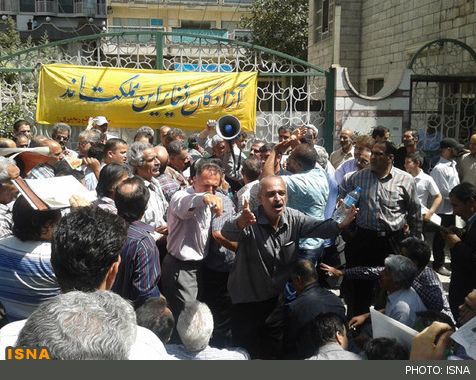
Security forces fired tear gas and arrested several veterans of the Iran-Iraq war who had gathered in front of the Foundation of Martyrs and Veterans Affairs.

Security forces fired tear gas and arrested several veterans of the Iran-Iraq war who had gathered in front of the Foundation of Martyrs and Veterans Affairs.
On Saturday, a group of Iranian war veterans once again staged a rally in Tehran to protest hardship amid a minimum 70-percent food price inflation and their inadequate pensions.
Videos published on social media show that the security forces and law enforcement agents fired tear gas with some veterans in critical condition due to the inhalation of the gas.
In another video, some of the participants called the officials of the Martyrs’ foundation and the Islamic Republic authorities "liars" and "criminals".
This is not the first time the war veterans protest against their poor living conditions.
In the past years, they gathered many times in front of the parliament urging lawmakers to resolve their issues.
In August, Iran's Council of Retirees reported that one of the veterans wounded in the Iran-Iraq war, named Khosro Yavari, set himself on fire and died in Songhor city of Kermanshah province due to financial hardship.
Earlier, Iran’s Parliament Speaker Mohammad Bagher Ghalibaf admitted in a televised speech in March that the Islamic Republic has failed to resolve economic problems and control inflation. He said the regime has not been able to help people in covering their daily life expenses.
These remarks come at a time when inflation has increased sharply this year and MPs have warned against another wave of inflation in the coming months.
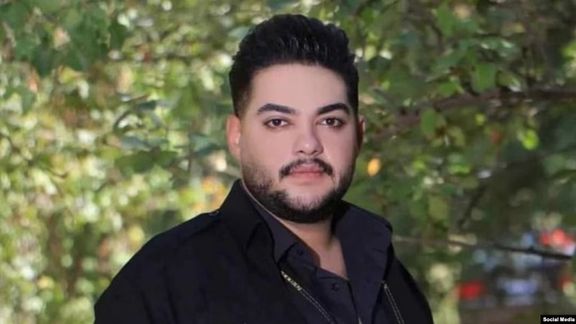
Another Iranian Kurdish political prisoner has succumbed to his injuries after being tortured in detention, human rights activists reported.
Peyman Galvani, 24, a resident of Mahabad was admitted to Khomeini Hospital after falling into a coma, according to Hengaw Human Rights.
His family was informed that Galwani had "fallen from a height" leading to his comatose state.
He was violently arrested by the security forces at his family home in Mahabad on June 25.
In the hospital, two security officers kept watch over him and prohibited family visits other than one exception made for his sister who observed extensive bruises on his body, head, and face.
His family says his death was the result of torture inflicted by the security forces, since the otherwise healthy young man did not have any preexisting medical conditions.
He is the second political prisoner who succumbed to his injuries in less than 24 hours as the regime continues its brutal suppression of opponents.
Kurdish human rights organizations reported Sunday that Mousa Esmaili, a political prisoner from Piranshahr in Iran’s West Azarbaijan province was also tortured to death.
According to Hengaw and Kurdistan Human Rights Network, intelligence organizations refused to hand over the body to his family to hold a funeral ceremony.
Esmaili, 35, from the village of Pasavi, was arrested on May 7 while intelligence agents confiscated his car.
Iranian intelligence and security agencies often bring unsubstantiated charges against dissidents, who are then tried behind closed doors without a lawyer. Several have died in unclear circumstances and torture.
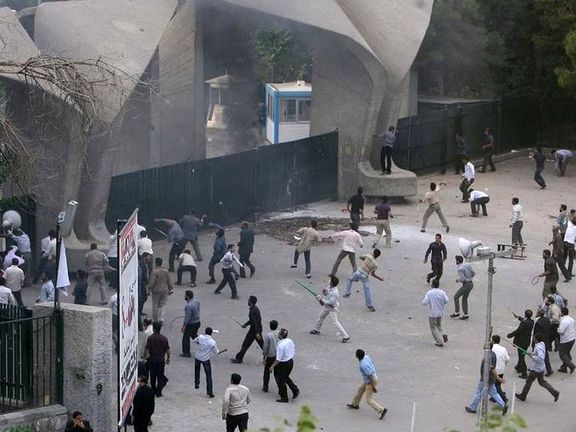
Iranians marked the 24th anniversary of a brutal attack on Tehran University students by vigilantes and security forces, which sparked widespread protests in July 1999.
On social media, many Iranians paid tribute to the students who lost their lives, were disabled, or went missing during the demonstrations.
Activist Masih Alinejad, based in the US, tweeted about the anniversary, stating, "Today is the anniversary...of the day when the regime attacked [the campus of Tehran] University to silence [anti-government] protests for good and to give students a lesson."
She further emphasized that despite years of repression, the students' struggle for freedom remains stronger than ever.
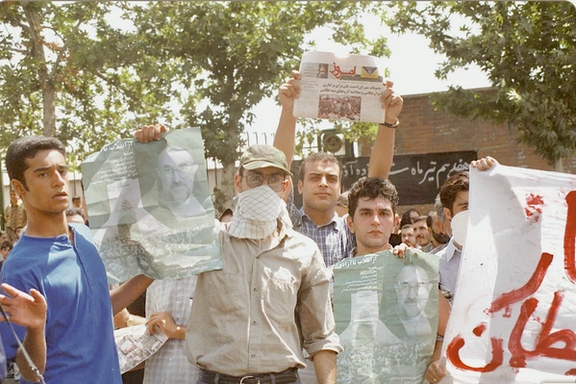
Iranian students also played a significant role in the 2022 and 2023 protests triggered by the death of Mahsa Amini, a young woman who died in the custody of the morality police in September 2022. In response, the regime has tightened its control over universities to suppress further protests and defiance of its hijab rules.
According to student sources, the Supreme National Security Council (SNSC) has recently granted extraordinary powers to university authorities and security forces to monitor and control students and professors. These powers include the ability to suspend students and even withhold salaries from professors who are critical of the government.
The student protests in July 1999 took place during the presidency of reformist Mohammad Khatami and were in response to the closure of the reformist newspaper, Salam. These protests were among the largest in the history of the Islamic Republic and were violently suppressed by authorities.
Salam newspaper had been ordered to shut down by the judiciary for publishing a classified letter from Saeed Emami, a former deputy intelligence minister, to the intelligence minister. In the letter, Emami called for increased media control and censorship.
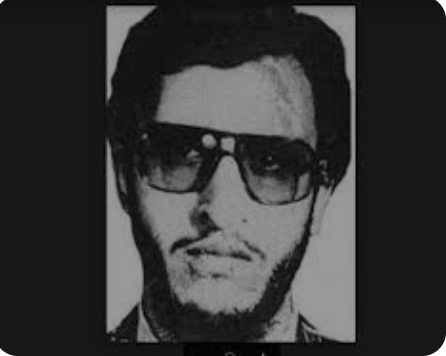
Prior to the publication of the letter, Emami died suspiciously in prison, where he was being held for his alleged involvement in the chain murders of dissident intellectuals, activists, and artists between 1988 and 1998.
The incident at the university campus, commonly referred to as the "Ku-ye Daneshgah Calamity," took place in the early hours of July 9. Armed plainclothes agents, Revolutionary Guards (IRGC) Basij militia, and hardliner vigilantes raided students' dormitories, attacking them indiscriminately.
Students were beaten, thrown down stairs or out of windows, and their belongings, including computers, were destroyed. Many students suffered broken limbs, and some were blinded. One student, Ezzat Ebrahim-Nejad, was fatally shot during the raid.
In the following days, tens of thousands of people took to the streets of Tehran and other cities to protest against the brutal attack on the students. The protests escalated into riots in some areas, leading to three more deaths and hundreds of injuries.
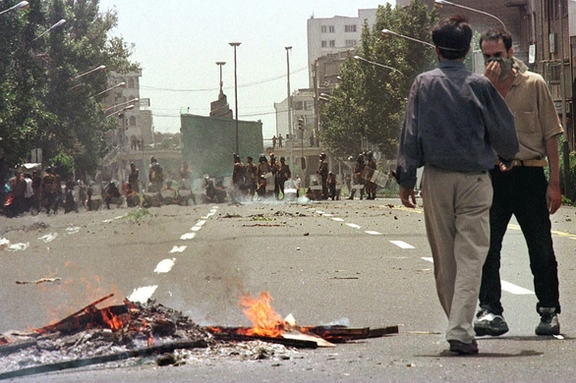
Security forces arrested over a thousand protesters during and after the demonstrations. Saeed Zeinali, one of the detainees, disappeared after briefly contacting his family and was never heard from again. Another young man, Akbar Mohammadi, was tortured to death in prison in 2006, several years after his arrest and death sentence. Mohsen Jamali, a top medical student, lost an eye during the raid when he was hit by a gas canister.
Despite the atrocities committed, Iran's judiciary only put a few low-ranking soldiers on trial and sentenced a conscripted soldier to three months in prison and a fine for stealing a shaving machine during the raid. All other individuals responsible for the attack were acquitted of all charges.
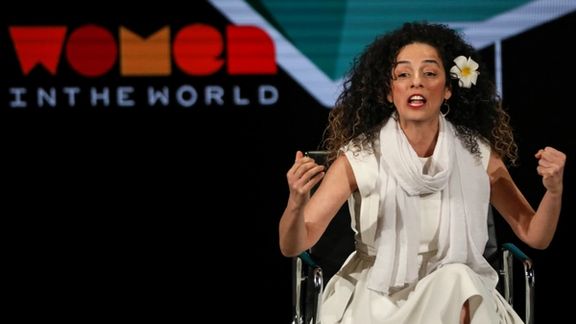
A US federal court has ruled that the Islamic Republic regime should pay over $3.3 million in damages to Iranian activist Masih Alinejad for detaining her brother.
The Iranian American journalist and women's rights campaigner released on twitter the court’s decision on Sunday. “In a major step, a US federal court has found the Islamic Republic of Iran guilty of wrongfully arresting my brother Alireza Alinejad and detaining him for two years to pressure me to stop my campaigns against compulsory hijab and gender apartheid.”
“The US District Judge G. Michael Harvey concluded Alireza was kept as a hostage for two years,” she added.
The judge awarded the plaintiff, Masih Alinejad, $1,662,500 in compensatory damages and $1,662,500 in punitive damages, after ruling in favor of her and against the defendant the Islamic Republic of Iran.
Alinejad sued the Iranian government, the Judiciary of Iran, and the Islamic Revolutionary Guard Corps (IRGC) as well as the Supreme Leader Ali Khamenei in 2019 for harassment against her and her family after the arrest of her brother.

She based her case on the Foreign Sovereign Immunities Act (FSIA), and Torture Victim Protection Act of 1991 (TVPA) for severe personal injuries and other irreparable harm suffered as a result of the regime’s “unlawful acts of terrorism, torture, hostage taking, and other torts against Alireza Alinejad-Ghomi (Plaintiff’s brother), and Ms. Zarrin Badpa, (Plaintiff’s mother).
“Alireza Alinejad-Ghomi was taken as a political hostage and continues to be tortured and imprisoned in order to discredit and intimidate Ms. Masih Alinejad and to pressure her to prevent her from speaking out against the Iranian regime,” read a part of the complaint submitted in December 2019.
Earlier in 2019, Alinejad announced that security forces had arrested her brother Alireza and were taking her family in Iran hostage to put pressure on her to cease her anti-regime activities. She also published a video clip in which her brother before his arrest said pressure on her parents had increased and they were being intimidated to condemn her and her activities on the state-run television (IRIB).
Alireza Alinejad was arrested in August 2019 and was later sentenced to eight years in prison. In 2020, his lawyer Saeid Dehghan, said Branch 36 of Tehran Province Appeals Court had confirmed an eight-year sentence for his client. Masih Alinejad announced the conditional release of his brother, writer and editor Alireza Alinejad, from Evin Prison in July 2021.
In her Sunday tweet, she urged all families, especially dual nationals held in detention, to file legal cases against the regime to prevent their loved ones from being used as bargaining chips.
She noted that this case was never about monetary compensation, but her “aim was to turn the spotlight fully on the crimes of the Islamic Republic.”
Many Iranians assuming that the court's judgement will be paid from Iran's frozen assets have raised questions about how fair it would be to pay money that belongs the Iranian nations to an individual or one family for their suffering. But the court's judgment does not specify that the money should come from any frozen assets.
Apparently, more court decisions are needed specifically to order the funds to be released from Iran's frozen assets that are mainly in Luxembourg. That would also require legal procedures in that country.
Other than that, there are no clear mechanisms to actually receive compensation from the Iranian government. It is obvious that it would deny any wrongdoing and condemn such rulings as an “interference in its internal affairs.”
Families of the victims of the 1983 Beirut barracks bombing, in which 307 people: 241 US and 58 French military personnel, six civilians, and two attackers also won court cases.
In their case filed against the Islamic Republic of Iran and the Ministry of Information and Security in 2001, the families of the 241 US peacekeepers sought a judgment that Iran was responsible for the attack and relief in the form of damages. In July 2012, federal Judge Royce Lamberth ordered Iran to pay hundreds of millions of dollars in damages and interest to the families. In April 2016, the US Supreme Court ruled that the regime’s blocked assets could be used, but there are no reports of families having received any money.
Masih Alinejad used the momentum and urged “Washington, and other governments, not to reward the Islamic Republic, which has no regards for human rights and is guilty of transnational repression,” also calling on American citizens to tell US elected officials not to engage with Islamic Republic.

Following an armed attack on a police station in Iran’s Sunni city of Zahedan Saturday, media affiliated with security forces have threatened the city’s top Sunni cleric.
The attack Saturday morning by four gunmen targeted a police precinct and resulted in the death of two officers and the attackers. The prominent Sunni religious leader Mowlana Abdolhamid quickly condemned the act, but media linked to the Revolutionary Guard and security organs threatened the dissident cleric on Sunday.
Nour News affiliated with the Supreme National Security Council issued a tweet, blaming Abdolhamid’s critical comments in the past nine months for the attack.
“Destructive statements against the system…are the red line of the regime,” the tweet said and added, “The pure blood of martyrs defending security who were martyred in the terrorist attack on precinct 16 in Zahedan, will not go without punishment.” Although Nour News did not name Abdolhamid, but the target of the threat is clear in the context of Iranian politics.
The attack was reportedly claimed by a Sunni militant group called Jaish al-Adl, or ‘the army of justice,’ which has been fighting the Islamic Republic for a long time but has been largely inactive in recent years. Some people speculated after the attack that it could have been staged by the government to prepare the ground for a crackdown of the restive Sunni population of Baluch ethnicity.
Tasnim new website affiliated with the Revolutionary Guard did directly address the Sunni cleric. In a report about the attack Tasnim wrote, “Mr. Abdolhamid, you are responsible for having prepared the ground for today’s terrorist operation.”
This was a direct reference to Abdolhamid’s stinging criticism of the regime and calling for a referendum on the future of the country, respect for women, the release of political prisoners, and genuine elections.
Tensions in Zahedan have been high since security forces, under the command of the Revolutionary Guard, killed an estimated 80-90 civilian protesters in the city on September 30, 2022, marking the start of anti-regime nationwide protests in Iran. This tragic event became known as Black Friday.
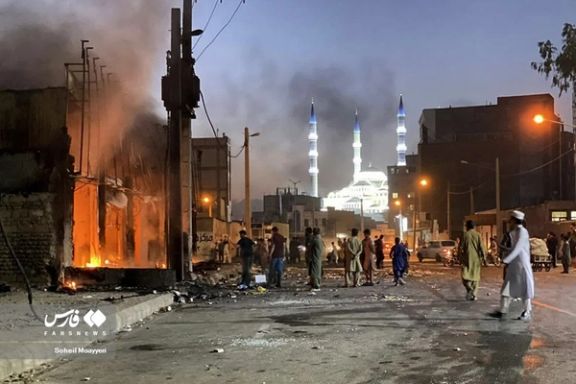
Since then, the people of Zahedan have been participating in peaceful demonstrations every Friday after prayers and sermons by Abdolhamid, their respected religious leader.
The authorities have attempted to intimidate and silence Abdolhamid, who has regularly criticized the rulers of the Islamic Republic in his sermons.
Some reports have suggested that the police station - precinct #16 - was the compound from where security forces opened fire last September, because it was close to the main mosque where people began their protest march.
Tasnim also threatened Abdolhamid’s followers claiming that they engage in destruction of public and private property, even though all Friday protests have been peaceful marches.
In his statement after the attack, Abdolhamid said, “Our path is pursuing solutions for difficulties society faces through negotiations and constructive criticism, ensuring the territorial integrity of the country and justice, by peaceful means.”
Although incidents of attacks against security forces have occurred in the impoverished and desolate province in the past, the general population has remained peaceful. On Friday, June 30 for example, Zahedan residents held a silent march in the city.
In recent weeks, the regime has escalated pressure on the outspoken cleric by arresting several individuals from his inner circle and supporters. Abdolhamid has also been prevented from leaving Iran for the annual Hajj pilgrimage in Saudi Arabia. In June, his grandson and several aides were arrested.

Kurdish human rights organizations say a political prisoner from Piranshahr in Iran’s West Azarbaijan province has been killed after being tortured while in detention.
Hengaw and Kurdistan Human Rights Network reported on Sunday that intelligence organizations refused to hand over the body of Mousa Esmaili to his family to hold a funeral ceremony.
According to these reports, after 62 days of detention, officials of the Urmia intelligence department called Ismaili's family and "without any explanation" asked them to come and receive the body of their son, but they refused to hand over the body later.
Esmaili, 35, from the village of Pasavi, was arrested on May 7 while the agents confiscated his car as well.
According to Hengaw, a source close to Ismaili's family said, "without any explanation or providing evidence of any judicial process and trial the security officers only said that Mousa was executed.”
Based on the report, Ismaili has not appeared in any court, and it is not even clear what were the charges against him. His family also insists that he was killed under duress.
The security and intelligence have also threatened the family that talking about the issue and publicizing it will have serious consequences for them.
Hengaw added that Esmaili had no contact with his family since his arrest, and during this time, the family's follow-ups with police and courts remained unanswered.
Iranian intelligence and security agencies often bring unsubstantiated charges against dissidents, who are then tried behind closed doors without a lawyer. Several have died in unclear circumstances and torture.